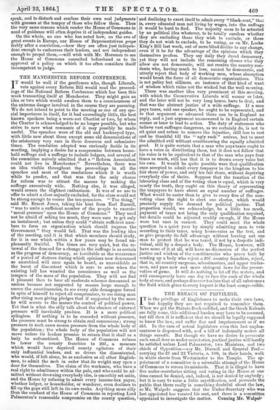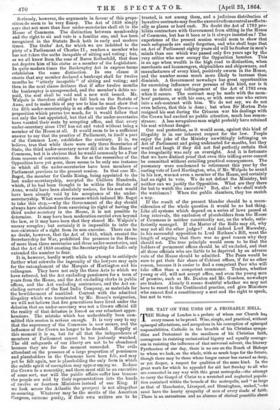THE BREAC OF PRIVILEGE.
IT is the privilege of Englishmen to make their own laws, but happily they are not required to remember them. When we get the Statute Book codified, and the Greek Kalends are fully come, this additional burden may have to be assumed, but till then it is sufficient that we should be legally supposed to know the law, and suffer fine and imprisonment as if we did. In the case of actual legislators even this last unplea- santness is dispensed with, and a bill of indemnity makes all things smooth. But though we have no desire to persecute such small deer as under-secretaries, poetical justice will hardly be satisfied unless Lord Palmerston, two Ministers, and two chiefs of Opposition—say Mr. Disraeli and General Peel— carrying the 21 and 22 Victoria, c. 108, in their hands, walk in white sheets from Westminster to the Temple. The ap- pointment of a committee is a miserable attempt of the House of Commons to screen its misdeeds. That it is illegal to have five under-secretaries sitting and voting in the House at one time cannot be denied, and, indeed, is not denied by anybody; but it is easy to raise a little mystification, and persuade the public that there really is something doubtful about the law, so Mr. Walpole suggests that the Under-Secretary who was last appointed has vacated his seat, and there is a committee appointed to investigate the matter. Cunning Mr. Walpolr to take this step,—why the Government of the day should If the result of the present blunder should be a recon- always have abstained from exercising its right of having the sideration of the whole question it would be no bad thing. third under-secretary in the House, it is not possible to Like all systems which depend on a series of laws passed determine. It may have been moderation carried even beyond long intervals, the exclusion of placeholders from the House the law, or it may have been that they shared Mr. Walpole's of Commons is neither consistently nor, on the whole, satis- uneasy scruples ; but certainly it is impossible to infer the factorily managed. If the Master of the Rolls may sit, why non-existence of a right from its non-exercise. There can be may not all the other judges? And indeed Lord Macaulay, no doubt, however, that the Act of 1855, which created the in his successful opposition to lewd Hotham's Bill, went the Secretaryship for War, prohibited the presence in the House length of arguing that thero was no good reason why they of more than three secretaries and three under-secretaries, and should not. The true principle would seem to be that the that the Act of 1858 creating the Secretaryship for India only holders of permanent offices should be all excluded, and that extended the number to four. all those officials who are liable to be deprived by an adverse It is, however, hardly worth while to attempt to anticipate vote of the House should be admitted. The Peers would be further what cobwebs the ingenuity of the lawyers may spin sure to get their fair share of Cabinet offices, if for no other for the entanglement of the Marquis of Hartington and his reason, because it is easier to find a competent Peer who will colleagues. They have not only the three Acts to which we take office than a competent commoner. Traders, whether have referred, but the Act excluding pensioners for a term of young or old, will not accept office, and even the young men years from the House, and the Act excluding clerks in public of promise, such as Mr. Buxton and Mr. Goschen, nowadays offices, and the Act excluding contractors, and the Act ex- are traders. Already it seems doubtful whether we may not eluding servants of the East India Company, as materials for have to resort to the Continental practice, and give Ministers the bewilderment of mankind. Content with the admitted who cannot find a constituency a seat and the right to speak, illegality which was terminated by Mr. Bruce's resignation, but not to vote.
we will not believe that five generations have lived under the delusion that an under-secretary was not a Crown official till the reality of that delusion is forced on our reluctant appre- DR. TAIT ON THE USES OF A PROBABLE HELL. hensions. The mistake which has undoubtedly been com- rE Bishop of London is a prelate of whom our Church has mitten this session is serious enough. It is very easy to say every reason to be proud. Wise, simple, and practical, without that the supremacy of the Commons is now secure, and the episcopal affectations, and-scrupulous in his conception of episcopal influence of the Crown no longer to be dreaded. Happily at responsibilities, Catholic in the breadth of his Christian sympa- this moment it is so, but for all that the independence of thies and Protestant in the manliness of his Christian faith, members of Parliament cannot be too jealously watched. courageous in resisting ecclesiastical bigotry and equally courage- The old safeguards of our liberty are not to be abandoned ous in resisting the influence of that universal solvent, the literary because they are for the moment unneeded. The evils Pyrrhonism of our day there is no one on the Bench of Bishops attendant on the presence of a large proportion of pensioners to whom we look, on the whole, with so much hope for the future, and placeholders in the Commons have been felt, and may yet be felt again, nor is placeholding the only form in which though there may be those whose longer career has earned as deep, the subtle spirit of corruption may appear among us. Reduce or yet deeper, a respect for qualities of the same kind. In the the Crown to a nonentity, and there must still be an executive great work for which he appealed for aid last Sunday to all who of some sort, ,-ner will the public affairs suffer less because are connected in any way with this great metropolis—the attempt the people are sold by their representatives into the hands to carry the Gospel of Christ to a wretched and neglected popula- of twelve or fourteen Ministers instead of one King. If tion contained within the bounds of the metropolis, and " as large wo look across the Atlantic the prospect is not altogether as that of Manchester, Liverpool, and Birmingham, united,"—he re-assuring. Whatever may be the merits of the American must have the hearty sympathy of men of every shade of faith. Congress, extreme purity, if their own writers are to be There is an earnestness and an absence of clerical punctilio about Seriously, however, the arguments in favour of this propo- trusted, is not among them, and a judicious distribution of sition do seem to be very flimsy. The Act of 1858 simply lucrative contracts may free the execativefrom controlaseffectu- says that not more than four under-secretaries shall sit in the ally as places or hard cash. No doubt the Act of 1782 pro- House of Commons. The distinction between membership hibits contractors with Government from sitting in the House and the right to sit and vote is a familiar one, and has been of Commons, but has it been or is it always insisted on ? The recognized in the Statute Book both in early and modern experience of the present session would seem to show that times. The Oaths' Act, for which we are indebted to the such safeguards are easily forgotten, and who shall hope that piety of a Parliament of Charles II., renders a member who an Act of Parliament eighty years old will be fresher in men's has not taken the oaths incapable of sitting and voting ; but, minds than one which was passed only five years ago by the as we all know from the case of Baron Rothschild, that does very critics who now occupy the Opposition benches. This not deprive him of his status as a member of the Legislature. is an age when wealth is- the high road to distinction, when In quite modem times the Bankruptcy Act in express terms merchants and loanmongers, shipbuilders and shipowners, and establishes the same distinction. In one clause it manufacturers of every kind, positively swarm in the House, enacts that any member declared a bankrupt shall for twelve and the number seems much more likely to increase than months be " utterly incapable " of sitting and voting; and diminish. A Government nowadays has great opportunities then in the next clause declares that if after twelve months for exercising influence over persons of this kind, nor is it the bankruptcy is unsuperseded, and the member's debts un- easy to detect any infringement of the Act of 1782 even paid, the seat shall be void and a new writ issued. Mr. when it occurs. The contract may be made with the mem- Walpole is therefore obliged to fall back on the Statute of hers' partners, or with his sons, or with some one who enters Anne, and to make this of any use to him he must show that into a sub-contract with him. We do not say, we do not the fifth under-secretaryship is an office under the Crown—a even believe, that this is done ; but when Sir Morton Pete proposition which proves too much, for it would follow that resigned his seat during the Crimean war his dealings with not only the last appointed, but that all the under-secretaries the Crown had excited no public attention, much less remon- have vacated their seats by accepting office, and that every strance. A less scrupulous man might probably have retained under-secretary since 1707 has sat and voted without being a his seat without danger. member of the House at all. It would seem to be a sufficient Our real protection, as it would seem, against this kind of answer to say that the practice of Parliament, in itself a part illegality is in our inherent respect for the law. People of the Common Law, establishes the contrary. It is, we enjoy the joke of the Ministry unwittingly infringing an believe, true that while there were only three Secretaries of Act of Parliament and going undetected for months, but they State, the third under-secretary never did sit in the House of would not laugh if they did not feel perfectly certain that Commons, but it is obvious that he would commonly be a Peer the irregularity was only an oversight. And it is fortunate from reasons of convenience. So far as the researches of the that we have distinct proof that even this trifling error cannot Opposition have yet gone, there seems to be only one instance be committed without entailing practical consequences. The in which all the under-secretaries have been members of yeomanry were condemned to retirement this year by the Parliament previous to the present session. In that case Mr. casting vote of Lord Hartington, who, if Mr. Walpole be sound Begot, the member for Castle Rising, being appointed to the in his law, was not even a member of the House, and certainly last under-secretaryship, accepted the Chiltern Hundreds, had no right to vote. We do not defend the Ministry, but which, if he had been thought to be within the Statute of neither can we justify the Opposition. What are they there Anne, would have been absolutely useless, for his seat would for but to watch the executive ? But, alas ! who shall watch have been already void by his acceptance of the under- the watchmen ? When the public slumbers, they too snatch secretaryship. What were the reasons which induced Mr. Begot a nap.































 Previous page
Previous page